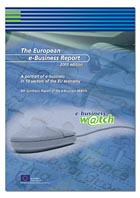 This is the fourth annual edition of e-Business W@tch which, since 2001, has been monitoring the adoption, development and impact of electronic business practice in different sectors in the European economy. This edition charts the dynamic rise of e-business practices in most sectors of the European economy but throws up some warnings about disparities in ICT take up and usage between EU countries.
This is the fourth annual edition of e-Business W@tch which, since 2001, has been monitoring the adoption, development and impact of electronic business practice in different sectors in the European economy. This edition charts the dynamic rise of e-business practices in most sectors of the European economy but throws up some warnings about disparities in ICT take up and usage between EU countries. Since its launch in 2001, e-Business W@tch â implemented by the Directorate-General for Enterprise and Industry of the European Commission â has monitored the adoption, development and impact of electronic business practice in different sectors of the European economy. Its main objective is to provide research-based sectoral analysis â both within the EU and the wider European landscape â for all e-business stakeholders. The publication has a special emphasis on the implications of information and communication technologies (ICTs) for small and medium-sized enterprises (SMEs).
The fourth e-Business W@tch report finds that rapid technological progress and increasing competitive pressure globally have all been important drivers for e-business adoption. However, the pace in different industries and within sectors (between small, medium and large companies) varies. Differences can still be found regionally in enterprises' ICT use, particularly among small companies in the EU.
Trends for now and tomorrow
The main trends identified include a further migration towards broadband internet and the growing use of ICT solutions for e-commerce. Interestingly, the so-called 'digital divide' seems to be closing between large and medium-sized firms, but small and, notably, micro enterprises continue to lag behind in this respect. In general, EU companies are mostly at a similar stage in e-business adoption in comparison with their international rivals. However, differences do exist between individual EU countries. The report also sets out potential trends for the future: the increasing use of Radio Frequency Identification (RFID) and a new focus on marketing and sales are two areas which are 'flagged up'.
Other results show that the nature, intensity and impact of electronic business activity differ between sectors, particularly between manufacturing and service sectors. Business to business (B2B) on-line trade has reached a significant level in all industries. Wide differences, however, remain in terms of 'customer-facing' e-commerce activities between sectors, with publishing and tourism leading the way.
As already identified in past editions of the report, large firms continue to drive the development of e-business. The deployment of Enterprise Resource Planning (ERP), the 'backbone' for many e-business applications, significantly increased in the 2003-2005 period.
e-Business W@tch also examines the policy implications of e-business and identifies an interesting antagonism: the promotion of ICT adoption as an eventual driver for productivity and competitiveness against the possibility of e-business activity contributing to market failure. The two most important policy objectives in 2005 were found to be the improvement of e-skills in smaller companies and the advancement of interoperability and standards.
The 2005 survey covered about 5 200 enterprises from ten different sectors across seven EU Member States. In addition, more than 70 case studies on e-business activity were carried out. In 2006, the e-Business W@tch is studying e-business implications in ten more sectors of the European economy, based on a survey of about 14 000 companies in Europe. Statistical results will be available by mid summer and the individual sectoral reports will be published (at www.ebusiness-watch.org) later in the autumn.
The European e-business report â 2005 edition
ISBN 92-894-5117-3
European Commission â Enterprise and Industry DG, Brussels, 2005
English, 237 pages, free of charge
http://www.ebusiness-watch.org/resources/documents/eBusiness-Report-2005.pdf